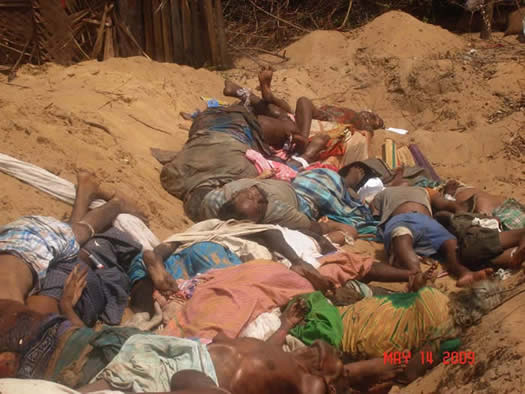Ilankai Tamil Sangam28th Year on the Web Association of Tamils of Sri Lanka in the USA |
|||
 Home Home Archives Archives |
Parameters for International Investigations into Sri Lanka’s Warby Jan Jananayagam, Tamil Guardian, November 23, 2010
There has been some convergence between Tamil and international demands for an independent international investigation into the events of 2009 in Sri Lanka. The international community now largely supports the view that the manner in which the last stages of the war in Sri Lanka were fought may constitute crimes against humanity. The Office of War Crimes of the United States Department of State, for example, states at the outset of its 2009 report on Sri Lanka that “on further congressional direction, [the report] focuses on reports of alleged conduct which may constitute violations of International Humanitarian law (IHL) and/or crimes against humanity occurring during a period of especially intensive fighting, from January through May 2009”. The International Crisis Group report of 2010 says (p24): “The government’s alleged actions concerning the supply of food and medical care to civilians including alleged attacks on humanitarian operations and hospitals deserves separate attention. They ... certainly raise the questions of whether individuals may also be responsible for Crimes Against Humanity.” The People’s Tribunal on Sri Lanka held in Dublin in January 2010 also made findings that crimes against humanity had taken place. It found that forced disappearances and violations committed in the camps holding internally displaced persons during and after the war “clearly constitute ‘crimes against humanity’, as defined in the Rome Statute, Article 7.” While the international community alleges war crimes and crimes against humanity, the Tamil Diaspora largely alleges genocide. This isn’t necessarily a contradiction. The difference centres on the parameters of any investigation of Sri Lanka’s conduct: what are the allegations to be investigated? Are they war crimes alone, or do they constitute a program of genocide? Diaspora organisations representing Tamil victims must involve themselves in the international efforts to investigate Sri Lanka’s wartime conduct. More precisely, they need to advance the demand for investigations in more specific ways than international NGOs and governments are able to do on their own. In this context, it is worth reviewing the definitions of the alleged crimes: War Crimes A war crime is an individual violation of the laws applicable in armed conflict, also known as International Humanitarian Law (IHL). It may be an individual violation of the Geneva Conventions or it may fit any of the conduct outlined in the Rome Statute underpinning the International Criminal Court (ICC). Individual soldiers and commanders may be held accountable for war crimes without necessarily implicating top military commanders or government officials. Crimes Against Humanity The Rome Statue of the ICC (2002) explains that “murder; extermination; torture; rape, political, racial, or religious persecution and other inhumane acts reach the threshold of crimes against humanity only if they are part of a widespread or systematic practice. ... They are not isolated or sporadic events, but are part either of a government policy ... or of a wide practice of atrocities tolerated or condoned by a government or a de facto authority.” The focus is on widespread systematic practice arising out of government policy. The Rome Statue thus defines crimes against humanity as any of the following acts when committed as part of a widespread or systematic attack directed against any civilian population, with knowledge of the attack:
Genocide The definition of genocide focuses more on intent than on actions – in particular on the intent to destroy a target group, in whole or in part. The UN Convention defines genocide as any of the following acts committed with the intent to destroy, in whole or in part, a national, ethnical, racial or religious group:
Alternative definitions of genocide exist, but the above is the essential one for the purposes of prosecution. The most intuitive definition of genocide is the original one, given by Raphael Lemkin, who coined the term. He was quite clear:
Parameters of investigation Both genocide and crimes against humanity are systematic and widespread acts. The difference lies in the intention behind those acts. Unlike a finding of crimes against humanity, a finding of genocide requires that prosecutors establish that the perpetrators had the intention to destroy, in whole or in part, an ethnic, national or other target group. While an ICC prosecution is made difficult by the fact that Sri Lanka is not a signatory to this the Rome Statute. So prosecution will require a Security Council referral – the UN Convention on Genocide is binding on all its signatory countries, and it creates universal jurisdiction in those countries for the alleged genocide in Sri Lanka. The Genocide Convention also imposes on its signatories a duty to prevent: so recognition of recent genocide could be an effective tool to argue for further preventive measures designed to prevent any continuing acts of genocide. It is time for Tamil victim groups to be very precise about exactly what allegations they believe should be investigated. It is no longer enough to call for ‘war crimes investigations’ as these can also be limited to individual incidents. While litigation should be brought for individual cases of torture, executions and so on in each country where victims or perpetrators (or their assets) can be located, the call for an international investigations needs to focus on the systematic nature of the crimes, and on the intent – effectively an investigation of genocide. Anything less would fail to capture the entire horror of what the Tamil people have experienced.
| ||
